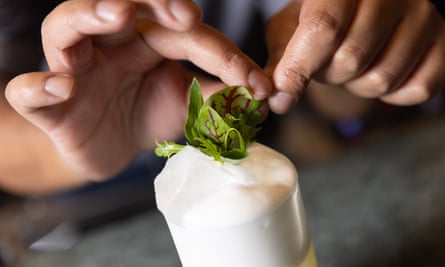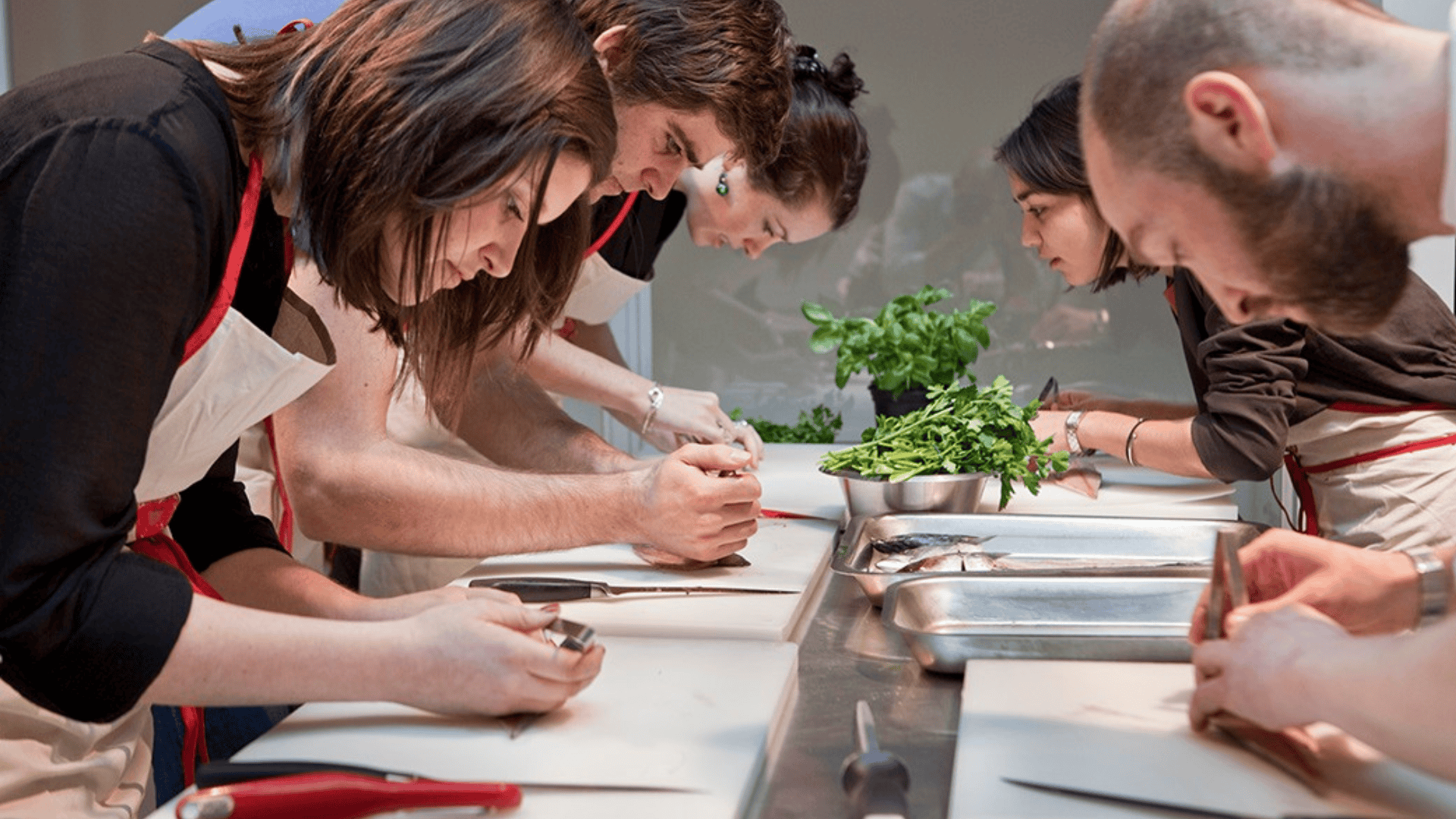Neon-coloured cocktails and sugary mixers might have been the order of the day until recently, but now an interest in natural flavours has taken off among London’s top mixologists.
With kitchens that resemble chemistry labs, and bottles full of home-fermented concoctions and syrups made of natural and foraged ingredients, cocktail makers are trying to bring customers closer to nature.
Ryan Chetiyawardana, known professionally as Mr Lyan, has pioneered this method in his cocktail bars across the US and UK. Ingredients currently on his menu include a drink made from ancient grains, which goes well in a margarita, and something he calls death bitters, which is made from herbs doused in liquid nitrogen. He also makes vinegars to add to cocktails made from vegetables grown in Growing Underground, a zero-carbon underground farm in Clapham, south London.
Chetiyawardana, who grew up in Birmingham, studied biology and has not left his test tubes and beakers behind. On the shelves of his bar Lyaness, on the South Bank in London, there are self-labelled bottles full of dark liquids, from mushroomy syrups to a cordial made from a piece of electrified wood.
“Nature provides so much room to explore,” he told the Guardian. “For a long time, the ingredients in cocktails have been restricted to a small subset, and I found that frustrating. Nature is so much more fascinating than that. There is more to acidity than just citrus fruits, or sweeteners than sugar, so how can we look to nature to demonstrate that to our guests, and also try to be more sustainable?”
At first, he made a virtue of his cocktail bars being zero-waste, using the entirety of an ingredient rather than throwing parts of it away. But he wanted to move the conversation further.
“We wanted to look at the wider impact of what goes upstream and downstream in the supply chain, and if instead of buying in syrups and other things from big producers, instead we are buying products from small farms and making our own ferments and so on, that is being more in control of the supply chain and ensuring all our produce is sustainably sourced,” he said.
Chetiyawardna pouring chilli brine. Photograph: Anna Gordon/the Guardian
Disposing of any waste becomes more eco-friendly, too, as the leftovers can simply be composted rather than thrown away.
Fermented fruits and vegetables, such as cucumber or pineapple, can add a tangy twist to a drink but can also support digestive health. Syrup made from pomegranate can add a sweet and fruity flavour to a cocktail, and also provide antioxidants.
Chetiyawardana decided to make his own ingredients after trying cocktails from 1950s recipe books using readymade ingredients and finding them lacking.
“When I started out, I was finding old cocktail books and recreating some of the old recipes before they were very prevalent. And I made, for example, a jack rose, which is essentially like a whiskey sour sweetened with grenadine. But the grenadine I had was a commercially made one you could get in any supermarket.
“The grenadine was just, like, a red syrup. Because it’s just been manufactured over time and the care was about production rather than about the trueness of it. And I thought: ‘This drink is terrible. Why was it such a celebrated drink back in the day?’ And then I read more into the ingredient and grenadine is a pomegranate syrup. The syrup I was using was missing the earthiness and that kind of plurality that pomegranate has. So I made it, and recreated the pomegranate syrup from scratch, and all of a sudden the drink sings.”
“There are things that have become very detached from nature or what they were originally about,” says Chetiyawardana. “And that’s to do with the scale of consumption in the world and a focus on people going well, we just want to manufacture this and sell it.”
“It’s lovely when you get that bit of variance. You know, when you get a raspberry that’s not just sugary, it’s got that like greenness to it as well and then like a little bit of like an orange blossom taste to it. That’s the way that nature should taste – it should taste rich, it shouldn’t be one dimensional. That’s the kind of complexity that we’re trying to bring back in the drinks. Those little bits that are beneath the surface are a little bit funky or dirty.”
 Adding a garnish of green herbs. Photograph: Anna Gordon/the Guardian
Adding a garnish of green herbs. Photograph: Anna Gordon/the Guardian
Recipe: Mr Lyan’s naturalness fizz
You will need:
50ml white rum
Juice of half a freshly squeezed lemon
2 teaspoons chilli brine* (or a small slice of chilli for a punchier take)
20ml honey water, ideally something brighter and floral, broken down in some hot water so it’s easy to pour
The white of 1 freshly cracked egg
Cubed ice
Chilled soda or sparkling water
Fresh herbs
Method:
Fill a highball glass all the way to the top with cubed ice. Add your chilli (or brine) to a shaker with the rum, lemon, egg white and honey, seal, then shake without ice – this whips in the air giving a richer texture. Add two handfuls of cubed ice, then seal and shake hard. You need to shake as vigorously as possible for about 15 seconds, until the outside of the shaker starts to frost. Crack open the shaker, then double-strain the drink over ice in your highball glass. Crown with soda water until the top of the foam reaches the lip of the glass. Gently spank some soft herbs to release the aroma, then add as a garnish.
To make the fermented chilli:
Slice and deseed some yellow chillis (keep the seeds if you’re good with spice). Add to a jar, and cover with a 3% salt brine solution. Add something (a smaller lid that fits inside your jar works well) to weigh down the fruit, then seal. Leave at room temperature for three days until small bubbles start to form then transfer to the fridge.
It should smell fruity and bright, and the brine should have a salty acidity, but with the fragrance from the chillis. It’s great in drinks (add some brine to your hot chocolate, or shake a slice into your margarita) and in cooking – you can use the brine as part of a dressing, and add slices of the chilli to a stew to bring a fruitiness and depth.
https://news.google.com/__i/rss/rd/articles/CBMib2h0dHBzOi8vd3d3LnRoZWd1YXJkaWFuLmNvbS9mb29kLzIwMjIvZGVjLzI2L2hlcmJzLW11c2hyb29tcy1hbmNpZW50LWdyYWlucy1sb25kb25zLXRhc3RlLWZvci1uYXR1cmFsLWNvY2t0YWlsc9IBb2h0dHBzOi8vYW1wLnRoZWd1YXJkaWFuLmNvbS9mb29kLzIwMjIvZGVjLzI2L2hlcmJzLW11c2hyb29tcy1hbmNpZW50LWdyYWlucy1sb25kb25zLXRhc3RlLWZvci1uYXR1cmFsLWNvY2t0YWlscw?oc=5




